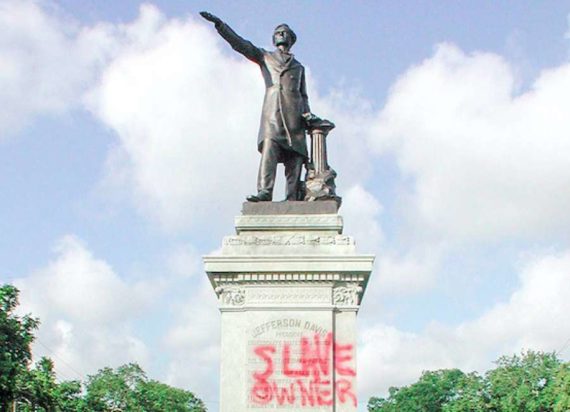Pro-Southern writers have long been suspicious of Victor Davis Hanson, given his association with the neoconservative ascendance of the Bush II era. Yet unlike most of his former colleagues, the California classicist seems to have learned something from the dramatic transformations of recent years. His book Mexifornia marked his enlistment in the unfashionable cause of border control, in part because of his first-hand experience of the consequences of mass migration. In the wake of the 2016 upheavals, Hanson joined a cadre of pundits who insist that global elites should take seriously the concerns which led to the passing of Brexit and propelled Donald Trump to the White House.
Now Hanson has come out in defense of Confederate memorials. On the blog American Greatness, he observes how contemporary attacks on the symbols of Dixie have disturbing precedents:
Cadres of frenzied French revolutionaries sought to wipe out all Catholic iconography, clergy, churches and monasteries, and are now condemned by history for their destruction. Joseph Stalin eliminated all pictures and even printed references to renegade Communist rival Leon Trotsky. The ultimate logic of today’s statue smashers is a similar effort to war against the past, and erase all the complexities, all the tragic lessons of history, and to replace it with some easy Manichean morality play. Where exactly will it stop?
Though he has no great affection for the South, Hanson is a refreshing contrast to most “conservative” pundits insofar as he is intellectually honest enough to acknowledge the long-term implications of politically-correct fanaticism. First they came for the Confederates, and I didn’t speak up because I wasn’t a Confederate ….
Hanson goes on to wonder whether there will be calls to edit out Shelby Foote’s contributions to Ken Burns’ The Civil War, or to ban the playing of songs like “Sweet Home Alabama” and “The Night They Drove Old Dixie Down.” I suspect these are rhetorical questions, for the answer is clearly “yes.” For some time now the only limits to the liberal democratic establishment’s hostility toward the South have been material and practical. Revolutionary activists are not presently in a strong enough position to launch a full-fledged hate campaign against Lynyrd Skynyrd, or to organize a public bonfire fueled by copies of Shiloh, but were that to ever change, only a fool would expect the political left to be restrained by disingenuous progressivist rhetoric about “tolerance” or “freedom of expression.”
Again, lest Hanson’s stance be misconstrued, it should be emphasized that he is no Southern sympathizer. To be sure, saying that Confederates “squared the circle of fighting for a bad cause by redefining it as protecting their ancestral homeland” certainly reflects a more generous attitude than that of most other contemporary journalists, who would demonize every last Dixie soldier from Rooster Cogburn to General Lee. It is better than nothing to see someone advocate the “great compromise,” whereby the South granted the righteousness of the Northern cause even as the North agreed to honor the valor of Southerners.
But the great compromise turned out to be unsustainable, and Hanson is wrong to suggest that Southerners were “fighting for a bad cause.” Indeed, we might serve back to Hanson his own astute remarks about the collapse of liberty and the rise of the Leviathan state:
In general, free societies more often become unfree with a whimper, not a bang—and usually due to self-righteous pious movements that always claim the higher moral ground, and justify their extreme means by their self-sacrificing struggle for supposedly noble ends of social justice, equality, and fairness.
Those of us familiar with Mel Bradford’s work will no doubt appreciate finding that a staunch Unionist concedes so much. Hopefully we may be excused for relishing the obvious irony.






